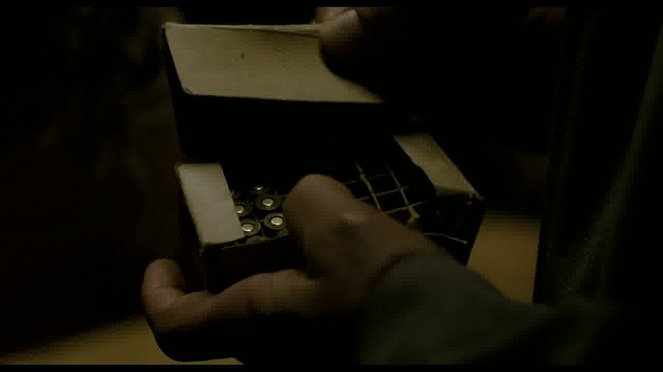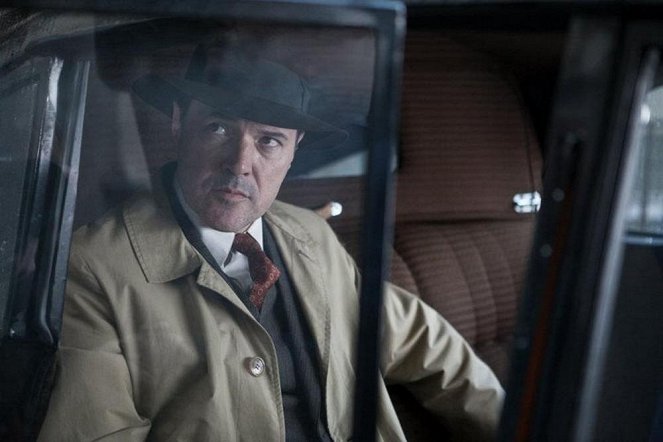Directed by:
David OndříčekCinematography:
Adam SikoraCast:
Ivan Trojan, Sebastian Koch, Soňa Norisová, Jiří Štěpnička, Marek Taclík, Filip Antonio, Norbert Lichý, David Švehlík, Martin Myšička, Miroslav Krobot (more)Plots(1)
The movie pictures a friendship and bravery at the times when courage was a ticket to the execution ground. Framed by a criminal story, the movie takes us to the spring of 1953, shortly after the death of the communist boss Klement Gottwald. He is replaced by Antonin Zapotocky who follows the tough course of repression and strengthening the communist regime. We see Captain Hakl pass through the dusky streets in his gray overcoat. A tenacious and somewhat choleric detective full of emotion and intuition, with whiskers and a hidden pain. Hakl has been with the police for 25 years having gone through service during the First Republic, Nazi occupation and now working for the communist National security. His apoliticalness and craving for partial truth bring him across more and more new facts implying that the seemingly simple case with an only suspect starts to twist. All the circumstantial evidence are heading to the Jewish community. He is followed by Major Zenke like a shadow, who is invited from East Germany as a specialist on Jewish crime. The story deals with a fabricated mugging orchestrated by the communist secret service in order to divert attention from the impending national disaster – monetary reform. This crime committed on a nation, having gotten out of control of the initiators, is one of the greatest robberies in Europe's modern history. (official distributor synopsis)
(more)Videos (2)
Reviews (9)
Three and a bit. As a detective or crime drama this was a very weak watch with the most obtuse plot and the shallowest characters possible. As a period film it was better, the atmosphere seemed believable and it was clear that the filmmakers had played around with it. However, the "message to mankind" and "honoring the memory of the brave" is similar to the crime storyline - poor (although the idea of making something "about that" is certainly commendable). Thanks for the excellent performances by Ivan Trojan and Sebastian Koch and the pleasant, almost noir cinematography, but no thanks for the rest and the overly long runtime.
()
Although Ondříček is once again working with his favorites Taclík and Trojan, his latest retro detective film does not remind us in the slightest of his older films. Which is a very good thing. Overall, the atmosphere, sets and costumes reflect the year 1953 very well. Moreover, the drama works and it is a pleasure to perceive the great acting performances of Jiří Štěpnička or Soňa Norisová next to the giant Sebastian Koch.
()
Actually, this could have been a very good retro detective film with stunning visuals and imaginative intermingling of music and image (Ondříček successfully followed in the traditions of Protector and Walking Too Fast, which started this "phenomenon" in Czech cinema). Nonetheless, this is a story from the 1950s, so any rationalization of the investigation is only favorable until the point when it appeals to the comrades themselves. And great praise is due to Mr. Ondříček for managing to suitably balance the share of mystery and for the fact that, when all’s said and done, this is really a "political detective thriller" that uses all of its "mystery" solely for the purpose of portraying the nervous and dark atmosphere of the 1950s as faithfully as possible.
()
In the Shadow has become the subject of many articles and the focus of film critics and journalists, who mostly welcomed it positively and praised it as a step back into the spotlight for Czech cinema. The same was true for Czech films like Protector or Walking Too Fast, and in all cases, I had to conclude that my view is significantly more critical and that, despite certain positives, from a global perspective, they are average films. Of those three titles, Ondříček's film seems to me to be the weakest. However, to not just criticize, I can start with the positives first. Firstly, the cast. Ivan Trojan is probably the greatest acting discovery of the post-November era and handles his detective role brilliantly. The supporting actors are also very good. Secondly, the film's budget and technical quality. It has been a long time since I have seen proper film cinematography and not a cheap TV production. The cameraman plays with light and shadows, and especially in the first fifteen minutes, it is truly a spectacle. This is also related to the attempt, albeit inconsistent, to create the retro atmosphere of the 1950s. Of course, there are also mistakes - the crew puts oil lamps in every room because it looks beautifully stylish, but as someone involved in the field, I would like to point out that Prague was already electrified during the reign of the Emperor, and oil lamps were only used in peripheral rural areas in the 1950s (full electrification was completed in 1960). However, this is obviously a detail that is not significant for most viewers. But it is worse with the screenplay, which caused me to only give it two stars. It would have been a fine film if it had been written by an American screenwriter and directed by an American director. However, this was created by Czechs, who should be steadfast in terms of our history. Moreover, it is not a light genre film, but an ambitious piece that wants to confront the past. The whole construction of the anti-Semitic conspiracy is simply too fragile and poorly conceived. The film begins as a neo-noir but quickly transitions into a psychological drama and, above all, a political thriller. This genre combination simply does not work well because, in my opinion, the film ultimately fails in all these genres. It doesn't work as a detective story at all because, to put it bluntly, the final revelation of the killer is incredibly ridiculous. As a political thriller, it is superficial and if it says anything, it's only the long-known truths. Interestingly, the most powerful films about communist crimes were made even during the functioning of real socialism. I am criticizing In the Shadow for significant logical errors that spoiled my enjoyment of the film, but unfortunately, I can't discuss them without revealing that the gardener is the murderer. Just as an example - I can't make sense of the character portrayed by Sebastian Koch in any way. What did the screenwriter mean by that? Overall impression: 45%.
()
Very solid. The atmosphere is excellent, dark and depressing, and thanks to the perfect sets, the tense 50s are literally palpable in every shot. The story unfolds like many classic crime thrillers and can't really surprise with anything, but the execution is almost flawless, from the cinematography, the aforementioned "rainy" atmosphere, the continuity of the twists and turns to the excellent performances. Ivan Trojan excels, confirming his reputation as the best Czech actor of our time, and much of the film relies on his heartfelt performance. Something similar can be said of Sebastian Koch, whose Major Zenke may not talk much, but he has charisma to spare. It's not a five-star treat, the story is still very hackneyed and lacking in emotion, but it has at least significantly restored my pride in Czech cinema after a long time. 80%
()



Ads